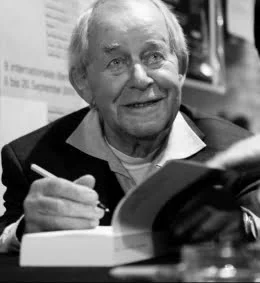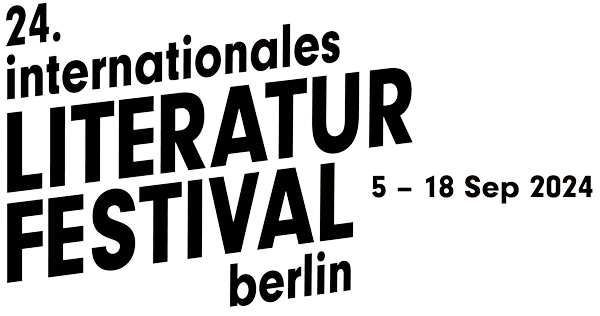
Siegfried Lenz
- Germany
- Zu Gast beim ilb: 2009
Siegfried Lenz was born in Lyck, a small town in Masuria, in 1926. After leaving high school early under special wartime arrangements, he joined the navy in 1943. Before the end of the war, Lenz defected to Denmark. He was held by the British as a prisoner of war for a short time and later returned on his own to Germany. The same year, he began studying philosophy, English and German at the University of Hamburg. When he was offered the opportunity to do a traineeship at the newspaper »Die Welt« 1948, he abandoned his studies. He worked on the paper’s editorial staff as an arts and features editor until the successful publication of his first novel »Es waren Habichte in der Luft« (1951, t: There were goshawks in the air) allowed him to leave.
From 1952 onwards, he regularly attended the literary meetings of the »Gruppe 47« (Group 47), where he met other prominent authors such as Günter Grass and Ingeborg Bachmann. Alongside Grass, Siegfried Lenz became involved with Germany’s Social Democratic Party (SPD) and Willy Brandt’s »Ostpolitik«, with which he found resonance owing to his background. Lenz has dealt with his ties to his childhood in Masuria in several literary works, such as the short story collection »So zärtlich war Suleyken« (1955; t: So tender was Suleyken) and the novel »Heimatmuseum« (1978; Engl. »The Heritage«, 1981).
Lenz himself said, »For me, writing is the best opportunity to learn to understand people, actions and conflicts.« For that reason, he usually makes use of a classic, realistic writing style to explore modern historical themes, much as does Hemingway. His most well-known novel, »Deutschstunde« (1968; Eng. »The German Lesson«, 1971), is the wartime and post-war story of a young German man who rebels against his dutiful father. In the best-seller, the author turns a critical eye on the themes of duty and responsibility in post-war Germany.
In addition to novels and short stories, the author has also written dramas and radio plays. While he functioned, in his early works, as a »portraitist of Germany in its brokenness, on its way to finding itself again« (Fritz J. Radatz, DIE ZEIT), his later works are more often devoted to psychological themes. In his novella, »Schweigeminute« (2008; t: Minute of silence), a student attending a memorial service for his former teacher recollects their deep, forbidden love affair. He has been awarded many prizes, including the Peace Prize of the German Book Trade, the Goethe Prize of the City of Frankfurt and, recently, the Lew Kopelew Prize for Peace and Human Rights.
In 2014 Siegfried Lenz died in Hamburg.
© international literaturefestival berlin
Es waren Habichte
in der Luft
Hoffmann und Campe
Hamburg, 1951
Das Feuerschiff:
Erzählungen
Hoffmann und Campe
Hamburg, 1960
Deutschstunde
Hoffmann und Campe
Hamburg, 1968
Heimatmuseum
Hoffmann und Campe
Hamburg, 1978
Schweigeminute
Hoffmann und Campe
Hamburg, 2008
Die Versuchsperson
Hoffmann und Campe
Hamburg, 2009
www.siegfried-lenz.de
